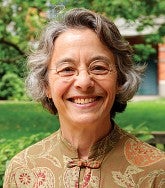2020-21 Visitors and Affiliates
Françoise Baylis
2020-21 Wayne Morse Chair Françoise Baylis is a bioethicist and university research professor at Dalhousie University, Nova Scotia. A philosopher whose innovative research in bioethics lies at the intersection of policy and practice, she challenges readers to think broadly and deeply about the direction of health, science and biotechnology. Her work aims to move the limits of mainstream bioethics and develop more effective ways to understand and tackle public policy challenge.
Judith Eisen
Biologist Judith Eisen is well known as a pioneer in using zebrafish as a model to study the nervous system. Her numerous scientific accomplishments include being elected to the American Academy of Arts and Sciences in 2018, named a fellow of the American Association for the Advancement of Science in 2017, and selected as a Guggenheim Fellow in 2010. She received the University of Oregon’s highest honor for research excellence, the Outstanding Career Award, in 2018.
Leah Lowthorp
"DNA Identities: Narrative and Authority in Genetic Ancestry Performance on YouTube"
The recent rise of direct-to-consumer genetic ancestry testing has had profound implications for identity. This project considers one genre of identity performance: the genetic ancestry test “reveal” on YouTube. It explores these performances by asking questions about the authority performers grant test results to inform racial and/or ethnic identities, the hierarchies of knowledge created when test results contradict family histories, and what these performances reveal about conceptions of biological determinism today. At a moment that elevates the technological over other forms of knowledge, this project considers online identity performance as part of the folklore of a genomic age.
Arafaat Valiani
“Communities of Risk: Genomics, Precision Medicine, and South Asian Caste Populations”
This ethnographic history investigates the emergence of genomics as a transnational field of biomedicine in South Asia and the United States. It places particular emphasis on the goal of “genetic health.” Since 2000, that goal has authorized the analysis of millions of genetic variations within specific ethnic or racial groups in hopes of revealing if and why certain populations could be predisposed to specific diseases. This project explores the ethics, technologies, and discourses which have structured the genetic mapping of Indian caste communities while also documenting genetic research in India before contemporary genomics.
Katrina Maggiulli
“Synthetic Biology, Gene Drives, and the Ethics of Manipulating Evolutionary Processes for Conservation Goals”





